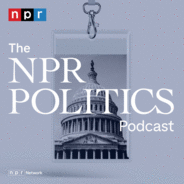A billion-dollar defamation lawsuit brought by Dominion Voting Systems against the broadcaster is tied to the outlet's full-throated embrace of former president Donald Trump's election lies and conspiracy theories — deceptions that forced one former Dominion executive into hiding.This episode: White House correspondent Scott Detrow, media correspondent David Folkenflik, and Colorado Public Radio reporter Bente Birkeland.This episode was produced by Elena Moore and Casey Morell. It was edited by Eric McDaniel. Our executive producer is Muthoni Muturi. Research and fact-checking by Devin Speak.Unlock access to this and other bonus content by supporting The NPR Politics Podcast+. Sign up via Apple Podcasts or at plus.npr.org. Giveaway: npr.org/politicsplusgiveaway Connect:Email the show at nprpolitics@npr.orgJoin the NPR Politics Podcast Facebook Group.Subscribe to the NPR Politics Newsletter.Learn more about sponsor message choices: podcastchoices.com/adchoicesNPR Privacy Policy

Politik
The NPR Politics Podcast Folgen
Every weekday, NPR's best political reporters are there to explain the big news coming out of Washington and the campaign trail. They don't just tell you what happened. They tell you why it matters. Every afternoon.Political wonks - get wonkier with The NPR Politics Podcast+. Your subscription supports the podcast and unlocks a sponsor-free feed. Learn more at plus.npr.org/politics
Folgen von The NPR Politics Podcast
1750 Folgen
-
Folge vom 08.03.2023Fox News Still Broadcasts Election Lies. It Could Cost Them.
-
Folge vom 07.03.2023How Department of Agriculture Is Reckoning With Racial InequityBlack farmers have long struggled with discrimination, inequities that persist today despite federal efforts to address them. Now, the USDA is out with a new equity report with a number of recommendations.This episode: White House correspondent Scott Detrow, political reporter Ximena Bustillo, and congressional correspondent Claudia Grisales.This episode was produced by Elena Moore and Casey Morell. It was edited by Eric McDaniel. Our executive producer is Muthoni Muturi. Research and fact-checking by Devin Speak.Unlock access to this and other bonus content by supporting The NPR Politics Podcast+. Sign up via Apple Podcasts or at plus.npr.org. Giveaway: npr.org/politicsplusgiveaway Connect:Email the show at nprpolitics@npr.orgJoin the NPR Politics Podcast Facebook Group.Subscribe to the NPR Politics Newsletter.Learn more about sponsor message choices: podcastchoices.com/adchoicesNPR Privacy Policy
-
Folge vom 06.03.2023We Traveled With Attorney General Merrick Garland To UkraineThe U.S. attorney general traveled to Ukraine to discuss war crimes investigations with top justice officials from around the globe. In an exclusive conversation, NPR interviewed Garland about why this work is personal to him. This episode: White House correspondent Scott Detrow, international correspondent Deb Amos, and national justice correspondent Carrie Johnson.This episode was produced by Elena Moore and Casey Morell. It was edited by Eric McDaniel. Our executive producer is Muthoni Muturi. Research and fact-checking by Devin Speak.Unlock access to this and other bonus content by supporting The NPR Politics Podcast+. Sign up via Apple Podcasts or at plus.npr.org. Giveaway: npr.org/politicsplusgiveaway Connect:Email the show at nprpolitics@npr.orgJoin the NPR Politics Podcast Facebook Group.Subscribe to the NPR Politics Newsletter.Learn more about sponsor message choices: podcastchoices.com/adchoicesNPR Privacy Policy
-
Folge vom 03.03.2023Will Supreme Court Un-Forgive Student Debt? Seems Like It.Democratic lawmakers and Republican activists both met for messaging conferences this week. The Supreme Court's conservative majority appears poised to strike down President Biden's order cancelling some student debt.This episode: congressional correspondent Susan Davis, congressional reporter Barbara Sprunt, political reporter Elena Moore, senior political editor and correspondent Domenico Montanaro, and legal affairs correspondent Nina Totenberg.This episode was produced by Elena Moore and Casey Morell. It was edited by Eric McDaniel. Our executive producer is Muthoni Muturi. Research and fact-checking by Devin Speak.Unlock access to this and other bonus content by supporting The NPR Politics Podcast+. Sign up via Apple Podcasts or at plus.npr.org. Giveaway: npr.org/politicsplusgiveaway Connect:Email the show at nprpolitics@npr.orgJoin the NPR Politics Podcast Facebook Group.Subscribe to the NPR Politics Newsletter.Learn more about sponsor message choices: podcastchoices.com/adchoicesNPR Privacy Policy
